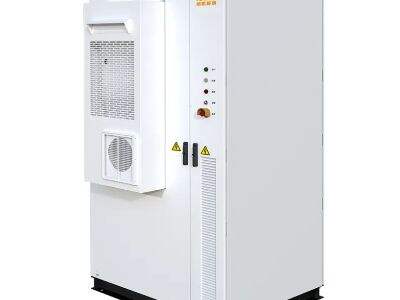Kaupalliset aurinkovoimaprojektit ovat viime vuosina yleistyneet ympäristöystävällisenä ja kustannustehokkaana sähköntuotantomuotona. Näissä hankkeissa energian varastointi on keskeistä, sillä se mahdollistaa energiavirran varmuuden silloinkin, kun aurinko ei paista. Tässä kirjoituksessa tarkastelemme tarkemmin litiumrautafosfaattibatterioiden käytön takaisinmaksuajan (ROI) ja skaalautuvuuden näkymiä kaupallisissa aurinkovoimasovelluksissa.
Litiumrautafosfaatin kustannus-hyötyanalyysi aurinkosähkön varastoinnissa
Litium-rautafosfaattipatterioiden (LFP) käyttö aurinkovoimalaitoksissa on merkittävästi hyötyä niiden pitkästä käyttöikästä. LFP-akkujen käyttöikä on enintään 10 vuotta tai pidempi, mikä osoittaa luotettavan, pitkäaikaisen energian varastoinnin mahdollisimman pienillä kustannuksilla. LFP-akkujen energiakäsittely on myös erittäin tiukkaa, joten ne voivat varastoida paljon latausta pienessä tilassa. Tämä mahdollistaa aurinkovoimalaitoksen kokonaiskustannusten minimoinnin käyttämällä tilaa täysin.
Litium-rautafosfaattiakkupaketin skaalautuvuuden arviointi kaupallisissa aurinkosähköasennuksissa
Skalaarisuus on tärkeä tekijä kaupalliseen aurinkosähköön tarkoitetun energian varastoinnin valinnassa. LFP-akkuja voidaan helposti skaalata, koska ne on suunniteltu modulaariseksi ratkaisuksi, joka voi kasvaa aurinkosähköhankkeen vaatimusten muuttuessa. Tämä skaalautuvuus voi tarkoittaa aluksi toteutettavan hankkeen investointikustannusten alentumista ja mahdollisuutta kasvaa liiketoiminnan mukana.
Litiumparisto- ja rautafosfaattitekniikan käytön kustannusvaikutukset aurinkovoimahankkeiden energian varastoinnissa
Hintatasolla: aurinkoenergian varastointiin on olemassa paljon edullisempia energiavarastoratkaisuja kuin LFP-akut. LFP-akkujen alkuperäiset hinnat ovat korkeammat muihin akkutyyppeihin verrattuna, mutta niiden pitkä käyttöikä ja korkea energiatiheys tekevät niistä pitkäaikaisesti katsottuna kustannustehokkaita. Lisäksi LFP-akkujen huoltotarve on vähäistä, mikä antaa niille toimintakustannuksissa etulyöntiaseman muihin akkotyyppeihin nähden, mikä puolestaan parantaa niiden kustannustehokkuutta.
Litiumparistojen pitkäaikainen kustannustehokkuus kaupallisissa aurinkosähköhankkeissa: vertailu
Ajan mittaan LFP-akut säästävät yrityksille huomattavia määriä rahaa, mikäli ne sijoittavat aurinkoenergiaan. ERITYISESTI LITIUMAKUISSA SUUREMPI ENERGIATIHEYS MAHDOLLISTAA AKKUJEN JA TILAN SÄÄSTÖN SEKÄ ASENNUSKUSTANNUSTEN VÄHENTYMISEN. Ne ovat myös pitkäikäisiä, mikä alentaa huoltokustannuksia, sillä niitä ei tarvitse vaihtaa yhtä usein kuin muita akkuja. Yhteenvetona voidaan todeta, että LFP-akut voivat auttaa kaupallisia aurinkoenergia-yrityksiä vähentämään kustannuksia ja parantamaan sijoituspalautetta.
Opiskellaan, miten liFePO4-akkupakkaa voidaan skaalata suurempiin aurinkoenergiaprojekteihin
Skaalautuvuudella on suuri merkitys suurten aurinkoenergiaprojektien yhteydessä. LFP-akkujen suurikokoinen käyttöönotto on erityisen houkuttelevaa näissä projekteissa niiden skaalautuvuuden ja korkean energiatiheyden vuoksi. LFP-akkua voidaan myös käyttää ESS-järjestelmän laajentamiseen suurissa aurinkoprojekteissa lisättäessä varastointikapasiteettia tarpeen mukaan. Tämä skaalautuvuus voi auttaa takaamaan projektin luotettavan ja vakaimman sähkön saannin, mikä lopulta tuo kustannustehokkuutta ja lisää kannattavuutta.
Sisällys
- Litiumrautafosfaatin kustannus-hyötyanalyysi aurinkosähkön varastoinnissa
- Litium-rautafosfaattiakkupaketin skaalautuvuuden arviointi kaupallisissa aurinkosähköasennuksissa
- Litiumparisto- ja rautafosfaattitekniikan käytön kustannusvaikutukset aurinkovoimahankkeiden energian varastoinnissa
- Litiumparistojen pitkäaikainen kustannustehokkuus kaupallisissa aurinkosähköhankkeissa: vertailu
- Opiskellaan, miten liFePO4-akkupakkaa voidaan skaalata suurempiin aurinkoenergiaprojekteihin

 EN
EN
 AR
AR BG
BG DA
DA NL
NL FI
FI FR
FR DE
DE EL
EL HI
HI IT
IT JA
JA NO
NO PL
PL PT
PT RO
RO RU
RU ES
ES TL
TL ID
ID UK
UK VI
VI TH
TH TR
TR AF
AF MS
MS BE
BE AZ
AZ BN
BN JW
JW KN
KN KM
KM LO
LO LA
LA MY
MY UZ
UZ KY
KY LB
LB XH
XH
